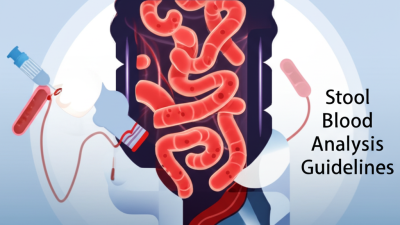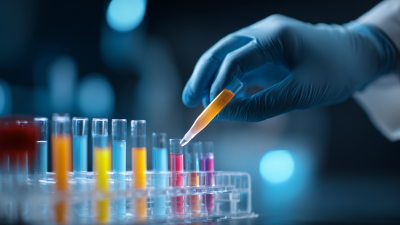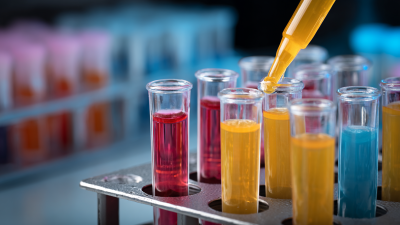Ultimate Guide to the H Pylori Antigen Rapid Test Kit: What You Need to Know
Table of Contents
- Overview of H Pylori and Its Health Implications
- Understanding the H Pylori Antigen Rapid Test Kit: Key Features
- How the H Pylori Antigen Test Works: Step-by-Step Process
- Interpreting Your H Pylori Test Results: What They Mean
- Advantages of Using the H Pylori Antigen Rapid Test Kit
- Common Misconceptions About H Pylori Testing and Treatment
- FAQS
- Conclusion
- Related Posts
Lately, there's been a lot of buzz about H. pylori infections. Turns out, around half of the people worldwide might be carrying this bacteria, which is a major culprit behind peptic ulcers and even linked to stomach cancer (World Health Organization, 2021). Because of that, there's a real need for quick, reliable tests—like the H Pylori Antigen Rapid Test Kit—that can give you results fast and are super easy to use. This kind of testing has become a game-changer in diagnosing H. pylori infections.
 A company called Jiangsu Macro & Micro-Test Med-Tech Co., Ltd., founded back in 2010, is really leading the way in this area. They focus on developing, manufacturing, and selling cutting-edge in vitro diagnostic reagents. Thanks to their own innovative tech and top-notch manufacturing skills, Macro & Micro Test is dedicated to improving healthcare outcomes by providing effective diagnostic solutions.
A company called Jiangsu Macro & Micro-Test Med-Tech Co., Ltd., founded back in 2010, is really leading the way in this area. They focus on developing, manufacturing, and selling cutting-edge in vitro diagnostic reagents. Thanks to their own innovative tech and top-notch manufacturing skills, Macro & Micro Test is dedicated to improving healthcare outcomes by providing effective diagnostic solutions.
Overview of H Pylori and Its Health Implications
So, you know that bacteria called Helicobacter pylori, or H. pylori for short? It's this tiny germ that sets up shop in your stomach lining, and surprisingly, it’s pretty common — about half the people around the world have it at some point. Now, most folks don’t even realize they’re infected because they don’t get any obvious symptoms. But for others, it can cause some pretty uncomfortable issues like stomach pain, bloating, or nausea. That’s why it’s good to know what to look out for; catching symptoms early can make a big difference.
What’s really important to remember is that H. pylori isn’t just about tummy aches. Over time, it can lead to more serious problems like ulcers or even stomach cancer. So, if you’re experiencing any of these symptoms, don’t ignore them — early diagnosis and treatment can really help prevent things from getting worse. Quick tests like the H. pylori antigen rapid test kit are super useful because they can detect an infection fast, so you can start treatment sooner rather than later. By catching and managing it early, you’re actually saving yourself from bigger health issues down the line.

Understanding the H Pylori Antigen Rapid Test Kit: Key Features
The H. pylori Antigen Rapid Test Kit has really become a go-to tool for figuring out if someone has a Helicobacter pylori infection. These infections are linked to all sorts of stomach issues, like gastritis and ulcers. One of the coolest parts? It gives you quick results—most of the time in about 15 minutes. That’s a huge win for both doctors and patients who want to get answers fast and start treatment without waiting around. The test works by looking for specific antigens in stool samples, and it does a pretty great job at confirming whether H. pylori is there or not.
Recently, studies have shown that immunoglobulin E (IgE) plays a pretty important role in our gut’s immune response, which is pretty interesting when you’re trying to understand digestive problems. Industry reports are also pointing out that more and more people are becoming aware of gastrointestinal issues, and that’s driving up the demand for quick, reliable testing like this one. Market forecasts suggest that the need for rapid tests in gastroenterology is only going to grow, mainly because more folks are dealing with H. pylori infections and there’s a bigger push now for preventative health. So, knowing what makes this test stand out—its speed, accuracy, and convenience—is really important whether you’re a healthcare provider or just someone trying to understand your gut health better.
How the H Pylori Antigen Test Works: Step-by-Step Process
The H. pylori antigen rapid test kit is a pretty handy tool when it comes to diagnosing Helicobacter pylori infections, which are linked to a bunch of stomach-related issues. The process is actually quite simple and quick, making it easy for both healthcare folks and patients to use. Usually, you start by taking a small sample — most of the time, that’s from stool. After that, you just add the sample to the test device, along with a special buffer to help kick off the reaction.
Once everything’s in place, the test uses antibodies that react specifically with the H. pylori antigens in the stool sample. If the bacteria are present, you’ll see a color change on the test strip—that’s how you know it’s positive. The whole thing is designed to be user-friendly, with clear instructions that walk you through each step. In about 10 to 15 minutes, you can interpret the results, which means you get quick feedback and can make timely decisions about treatment. All in all, this speedy process not only helps with fast diagnosis but also eases patient worries about their health.

Interpreting Your H Pylori Test Results: What They Mean
Figuring out what your H. pylori Rapid Test Kit results mean is pretty important when it comes to your gut health. Basically, this simple test uses a stool sample to check for Helicobacter pylori, a bacteria that’s been linked to a bunch of digestive issues like gastritis and ulcers. Interestingly, the World Health Organization estimates that more than half the folks worldwide are carrying H. pylori — wild, right? If you get a positive result, it usually means the bacteria is active in your system, so it’s a good idea to chat with your doctor about next steps or possible treatment options.
Once you have your results, it’s super important to understand what they really indicate. A negative might mean you’re not currently infected, but keep in mind that sometimes false negatives happen — maybe because of recent antibiotics or other factors. The best move? Definitely talk to your healthcare provider about your results. They might suggest additional tests just to be sure.
**A few tips to keep in mind:** Try to avoid antibiotics and proton pump inhibitors for at least four weeks before taking the test — this can help make sure your results are as accurate as possible. Also, eating a balanced diet loaded with plenty of veggies and fiber can boost your digestive health and might even help lower the risk of H. pylori infection. Staying mindful of these little things can make a big difference.
Advantages of Using the H Pylori Antigen Rapid Test Kit
The H. pylori Antigen Rapid Test Kit is really a game-changer when it comes to diagnostic healthcare, especially for spotting Helicobacter pylori infections. One of the best parts? It gives quick results—usually within just a few minutes. That means doctors can make decisions faster, which is huge for patient care. Patients love getting immediate feedback because it cuts down on the waiting and eases a lot of anxiety, plus it keeps the whole process smooth and straightforward.
On top of that, this test is pretty reliable. Its high accuracy means there’s less worry about false positives or false negatives, so you can trust the results. That’s super important when figuring out the right treatment, especially if H. pylori is suspected to be behind things like stomach ulcers or other digestive problems. Using this test, healthcare providers can confidently prescribe targeted treatments, which really helps improve how things turn out for the patient. All in all, it’s a solid step forward in making diagnosis quicker, more dependable, and less stressful for everyone involved.
Common Misconceptions About H Pylori Testing and Treatment
When it comes to testing and treating H. pylori, there are quite a few misconceptions that tend to confuse people. For example, a lot of folks believe that if they have H. pylori, it automatically means they’ll get an ulcer. Well, that’s not always the case. While H. pylori does play a role in causing peptic ulcers, not everyone with the bacteria will develop one. In fact, according to research published in the *Journal of Gastroenterology*, only about 10-15% of infected individuals end up with ulcers. So, a lot of people might be walking around with the bacteria and no symptoms at all.
Another myth is that once you’ve been treated for H. pylori, you basically can’t get it again. But that’s not entirely true either. Studies have shown that reinfection can happen, especially in areas where infection rates are pretty high. The World Health Organization points out that it’s really important to follow your doctor’s advice after treatment and do follow-up tests to make sure the bacteria is gone for good.
**A few tips:** Always check with your healthcare provider to figure out the best testing options for you. Quick test kits can catch the infection early and help prevent bigger problems down the line. And don’t forget, good hygiene’s your friend here—since H. pylori can be spread through contaminated food and water, keeping things clean makes a big difference. Knowing these facts can really help you take control of your digestive health and stay informed about what’s going on."
Ultimate Guide to the H Pylori Antigen Rapid Test Kit: What You Need to Know
| Dimension | Details |
|---|---|
| Test Purpose | To detect the presence of H Pylori antigens in stool samples |
| Testing Method | Rapid immunochromatographic assay |
| Result Time | Approximately 15-20 minutes |
| Sensitivity | 85% - 95% depending on the assay |
| Specificity | 90% - 98% depending on the assay |
| Common Misconception | Blood tests are more reliable than stool tests for H Pylori detection |
| Recommended Follow-Up | Confirm negative results with endoscopic biopsy if symptoms persist |
| Treatment Options | Antibiotics combined with proton pump inhibitors |
FAQS
: A positive result generally indicates an active infection of Helicobacter pylori, suggesting the need for further evaluation or treatment.
Not entirely, as false negatives can occur, especially in recent infections or if antibiotics were used before the test. Consulting with a healthcare provider is essential for a comprehensive understanding.
To ensure accurate testing, avoid antibiotics and proton pump inhibitors for at least four weeks prior to the test.
No, while H. pylori is linked to peptic ulcers, only about 10-15% of those infected actually develop ulcers, and many carry the bacterium asymptomatically.
Yes, reinfection can occur, particularly in areas with a high prevalence. It is important to follow post-treatment guidelines and undergo follow-up tests.
Maintaining a balanced diet rich in vegetables and fiber, practicing good hygiene, and consulting with healthcare providers for testing can help reduce risks.
H. pylori is often transmitted through contaminated food and water, making good hygiene practices important for prevention.
A healthcare provider can help interpret the test results, recommend appropriate follow-up testing, and discuss treatment options based on individual health needs.
Conclusion
Hey there! If you're curious about testing for Helicobacter pylori, our 'Ultimate Guide to the H Pylori Antigen Rapid Test Kit' is a great place to start. It gives a full rundown of what H. pylori is and why it really matters for your health. The guide walks you through how the test works, step by step—pretty handy if you're thinking about doing it yourself or just want to understand what’s happening. Plus, it helps you make sense of the results so you can really get what they mean. We also highlight the benefits of using this quick test and clear up some common myths around H. pylori testing and treatments.
Here at Jiangsu Macro & Micro-Test Med-Tech Co., Ltd., we’re all about pushing healthcare forward with innovative detection tech and top-notch diagnostic tools. Our H Pylori Antigen Rapid Test Kit is a perfect example of that commitment—designed to be reliable and easy to use, helping both healthcare pros and patients get accurate results without the hassle.
Related Posts
-

Step-by-Step Guide to Understanding H Pylori Testing: Stool vs. Blood Analysis
-

Exploring Innovative Alternatives to HPV E6 E7 mRNA Testing for Enhanced Cancer Detection
-

5 Unforgettable Reasons to Choose the H1N1 Real Time PCR Kit for Accurate Testing
-

Solutions for Effective Dengue Test Antigen Procurement Management
-

Chinese Excellence in Manufacturing Best Malaria PV Driving Global Supply Chain Solutions
-

The Future of Best tt3 Innovations in Efficiency and Performance

